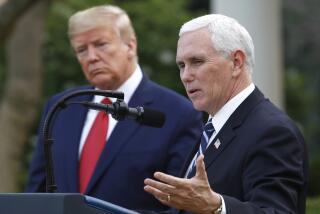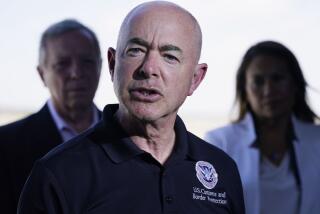In his first year, Pompeo brought ‘swagger’ but made little progress on foreign policy priorities
Reporting from Washington — When he took over a troubled State Department a year ago, Secretary of State Michael R. Pompeo promised to restore its “swagger,” an unlikely goal for the staid diplomatic set.
He also vowed to raise morale, fill vacant posts, oversee more transparent diplomacy and allow greater access to his decision-making. His promises were greeted with cautious optimism at Foggy Bottom after the problem-plagued leadership of Rex Tillerson.
Today, scores of key ambassadorships and other senior posts remain unfilled. Pompeo has named political appointees to positions normally held by foreign service officers. And at times, he has injected his Christian evangelical faith into policy, overshadowing other human rights concerns.
Pompeo, who previously led the CIA, staunchly defends his leadership at the State Department. He cites a realignment of foreign priorities under President Trump’s “America first” policy, including improving relations with some problematic allies, such as Egypt, as well as longtime adversaries like North Korea.
“This year has been an enormous success,” Pompeo, 55, said Friday in the State Department’s flag-festooned lobby at an anniversary event that began with the strains of “Happy” by Pharrell Williams.
“We are growing again. … We’ve created an idea, one team, one mission, one future,” he told several hundred employees. He called on them to embrace a new professional “ethos” as they conduct “a new beginning” in foreign policy under Trump.
Pompeo’s enthusiasm hasn’t translated into many solid foreign policy successes for administration priorities, however.
Tensions have eased with North Korea over the past year, but there’s no sign of a nuclear disarmament deal despite two high-profile summits between Trump and North Korean leader Kim Jong Un. Even working-level talks have largely ground to a halt.
The White House last year pulled out of the 2015 Iran nuclear deal, insisting it would force Iran back to the negotiating table for more concessions. That has gone nowhere. Pompeo’s efforts since January to force Venezuela’s leftist President Nicolas Maduro to step down also have foundered.
A push to produce a Middle East peace plan faltered after the White House effectively sidelined the Palestinians, a critical part of any deal. After multiple delays, Jared Kushner, the president’s senior advisor and son-in-law, now says he will unveil a plan in June.
Pompeo’s loyalty and access to Trump — the two shared a private lunch on Thursday — has given him unusual influence in a White House wracked by turmoil and turnover. But critics worry about a partisan fervor rare for America’s top diplomat.
“Mr. Pompeo is a partisan warrior on behalf of Trump … as opposed to being the head of the State Department,” said Paul Pillar, a 28-year CIA veteran who is now a senior fellow at Georgetown University.
“Far from emphasizing diplomacy, he is deemphasizing diplomacy,” Pillar said.
After he was sworn in last April 26, Pompeo initially received good marks at the State Department for lifting a ban on hiring spouses of foreign service officers, an unpopular prohibition imposed by Tillerson.
But like Tillerson, Pompeo did not fight the White House when it proposed budget cuts of up to 30% for the State Department and its various arms, including the U.S. Agency for International Development, a major conduit for disaster aid. Congress restored some of the money last year, but further cuts loom for 2020.
Pompeo has helped Trump fill some diplomatic posts, as he promised. But 48 of 188 ambassadorial posts — about one in four — sat empty, according to the American Foreign Service Assn., which tracks the appointments. They included such high-profile posts as the United Nations, Pakistan and, until recently, Saudi Arabia.
By comparison, Presidents Obama and George W. Bush had filled about 92% of their ambassadorial posts two years into their tenure.
The gaps are just as glaring at State. Nine of 24 assistant secretary positions are empty, including four of the six bureaus responsible for specific regions, including the Middle East. Only two of six undersecretary positions are filled.
“The documented deficit in core diplomacy positions needs to be addressed, and soon, if we are to avoid losing further commercial, economic, and even political ground to competitors” like China, said Barbara Stephenson, president of the foreign service association.
Pompeo, with some justification, blames Senate Democrats for slow-walking confirmation of Trump’s nominees.
For example, the Senate has yet to confirm Brian Bulatao, who was nominated in June 2018 as undersecretary of State for management, the department’s third-ranking job. Bulatao attended West Point with Pompeo, was later his business partner and then served as his chief operating officer at the CIA.
Democrats have not questioned Bulatao’s qualifications. Sen. Robert Menendez (D-N.J.), the ranking member of the Senate Foreign Relations Committee, has blocked the nomination over his demand for internal documents about whether political appointees at the State Department searched social media for signs that other employees were criticizing Trump. The department’s inspector general is investigating allegations of political retribution.
But some nominees have been sidelined for cause.
The nomination that has languished longest is that of Douglas Manchester, a San Diego hotel tycoon and former publisher of the San Diego Union-Tribune, who was chosen by Trump to be ambassador to the Bahamas. Manchester told his Senate confirmation hearing in August 2017 that the Bahamas was “for all intents and purposes” a part of the United States. Though less than 100 miles off the Florida coast, the Bahamas is a sovereign nation.
::
Born and raised in Orange, Calif., Pompeo graduated at the top of his class from West Point, served in the Army and moved to Kansas, where he made a fortune in defense-industry sales. He was elected to Congress in 2010 as a vocal member of the Republican tea party faction and was reelected twice.
Barrel-chested, square-jawed and energetic, Pompeo still embraces military jargon, referring to diplomatic goals as “the mission set.” He also remains a strong booster for Trump.
After Trump’s State of the Union address in January, for example, Pompeo praised the president for “putting the interests of the American people first and reasserting American leadership around the world. History will remember this period.”
Pompeo’s supporters contend his partisan bent is no longer unusual, noting that traditional bipartisanship has given way to a more divisive style of politics, even in foreign policy.
“Pompeo has done a great job with the hand he was dealt,” said James Jay Carafano, a foreign policy expert at the conservative Heritage Foundation think tank who advised the Trump transition team.
“He had a department suffering a crisis of confidence, internally skeptical of its leadership and its role,” Carafano said. “And a very unconventional, demanding president on the other side. He has done well in both jobs.“
Julian Zelizer, a historian at Princeton University, says Pompeo has taken partisan politics further than his predecessors at the State Department.
“Like Trump, he fully embraces partisan politicization and acts according to what is best for reelection and the Republican Party,” Zelizer said.
Pompeo’s public reliance on his evangelical faith has raised eyebrows among diplomats. When he issued the annual human rights report in March, Pompeo said the U.S. was “doing the Lord’s work.” He keeps an open Bible on his desk, he said, “to remind me of God and his word, and the truth.”
He has cited his faith in supporting a White House policy on Israel that upended decades of diplomatic precedent. Last month, he suggested Trump may have become president to fulfill God’s will and free the Jewish people.
In emphasizing religious freedom, the State Department has downgraded women’s rights and rights for gay and lesbian people by eliminating or cutting funding for some overseas programs, and has expanded a policy that bars giving U.S. aid to women’s health organizations that perform abortions or provide counseling for them.
He praised Egyptian leader Abdel Fattah Sisi as a “beacon for religious freedom” because he allowed a new Coptic Christian church to be built in a Cairo suburb. Human rights groups accuse Sisi’s regime of widespread torture of political prisoners, and using death sentences to settle political scores.
Despite his pledge of greater transparency, once-daily State Department briefings by an official spokesman are now infrequent, and he allows far fewer reporters on his official trips than previous secretaries. He also sometimes shows surprising pugnaciousness toward his former colleagues in Congress.
In November, after Democratic and Republican senators rebuked Pompeo for refusing to blame Saudi Arabia’s government for the slaying of U.S.-based Saudi journalist Jamal Khashoggi, Pompeo responded with a scathing op-ed in the Wall Street Journal.
He complained of “Capitol Hill caterwauling and media pile-on.” Trump’s support for Riyadh isn’t “popular in the salons of Washington,” he added, but argued that U.S.-Saudi ties are more important than a single death.
Last month, Pompeo was testifying to a House appropriations subcommittee when the chairwoman, Rep. Nita Lowey (D-N.Y.) asked a pointed question. “Mr. Secretary, … I’d like to ask you if you think the State Department has gotten its swagger back.”
When the laughter subsided, Pompeo responded:
“I hope so, but I’ll leave that to others to judge,” he said. “I hope they have. I have.”
For more on international affairs, follow @TracyKWilkinson on Twitter
More to Read
Sign up for Essential California
The most important California stories and recommendations in your inbox every morning.
You may occasionally receive promotional content from the Los Angeles Times.











